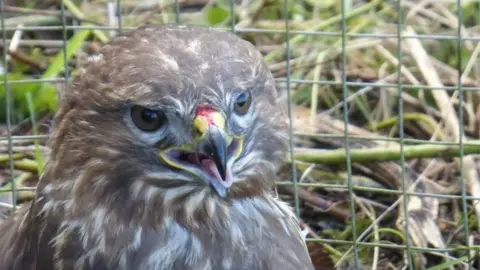Derbyshire joins RSPB's list of bird crime hotspots
 Tom Grose RSPB
Tom Grose RSPBA wildlife charity has added Derbyshire to its list of bird of prey crime hotspots.
The RSPB said raptor persecution remains at a sustained high level, especially in England.
Mark Thomas, RSPB head of investigations UK, called for changes to the law, saying: "The illegal shooting, trapping and poisoning of birds has no place in modern society".
The government said those who harm birds should face the force of the law.
Mr Thomas added: "In a nature and climate emergency, the deliberate destruction of protected species for financial gain is completely devastating and unacceptable.
"The time for reform is now long overdue."
It is calling for an introduction of licences for all driven grouse shooting and better enforcement of existing regulation and additional regulation for pheasant and partridge shooting.
'Key species'
RSPB chief executive Beccy Speight said: "The evidence shows that the illegal persecution of birds of prey - which is time and time again linked to gamebird shooting - is holding back the recovery of some key species."
The charity said that in 2021, over two thirds (71%) of all confirmed incidents of raptor persecution related to land managed for gamebird shooting, where birds of prey are seen by some as a threat to gamebird stocks and illegally killed.
The charity has said there were 80 confirmed incidents in England, making it the second-worst year on record.
The RSPB considered 10 years' data on crimes targeting birds of prey before deciding to add Derbyshire to its list of "hotspots" bird crime.
One incident - caught on camera by the RSPB - showed a gamekeeper beating buzzards to death in a trap in Nottinghamshire.
Adrian Blackmore, a director of the Countryside Alliance said: "The shooting community remains committed to eradicating raptor persecution, with a zero tolerance towards all wildlife crime, including the illegal persecution of birds of prey.
"There was a reduction in the number of incidents in 2021 which should be welcomed and it is unfortunate that the RSPB should choose not to do so.
"Of the two-thirds of incidents that have been connected to gamebird shooting, only 21% at the very worst can be linked to grouse shooting.
"Despite this, the RSPB sees the licensing of driven grouse shooting as its top priority, even though its own data fails to support such a stance."
A Defra spokesperson said: "We recognise the importance of tackling wildlife crime, which is why we have doubled funding for the National Wildlife Crime Unit.
"We are clear those found guilty of harming animals should be subject to the full force of the law."

Follow BBC East Midlands on Facebook, on Twitter, or on Instagram. Send your story ideas to [email protected].
